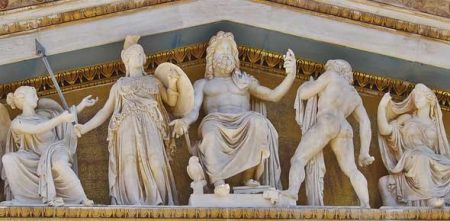Following is a guest post from Dan Lindberg.
In last week’s post, I talked about the (not so) new paganism that we see in modern America. While increasingly overt, there can be some subtleties as to how they operate in our world. But after revealing them for what they are, we are left with the question, “What do we do about them?” Here are some practical suggestions:
Mars, the god of war. In the sermon two weeks ago, we heard Jesus say, “Blessed are the peacemakers.” So how do we make peace in Naperville and Chicagoland? First that requires us to know our community well enough to know two things:
- Where conflict is arising – the real business of making peace is of course being in front of the issue and working it out before it starts tearing people apart. Jesus had a nationalist zealot in Peter who could be a disciple alongside Matthew, the tax collector who was viewed as a traitor by those zealots. Can you imagine the first time they met?
- Where there is already conflict –Jesus’ response to the question of paying taxes to Caesar can be instructive here, as the last Jewish armed uprising that occurred before Jesus was precisely due to paying taxes with idolatrous coins. Likewise, where does our history and culture promote forms of conflict?
Knowing those things is just the start. Reconciliation is always cross-shaped, which means that we show the world Christ through his love and service. How do we get that power? The Gospel! The redemptive love that saves us from ourselves is the same love that we extend to our war-torn world.
Aphrodite, the god of love, beauty, and sexuality. We need to celebrate the right ordering of love, beauty, and sexuality. The coming together of man and woman in marriage is a signpost of hope, and its consummation brings forth new life. First, a reflection on this reveals an incredible biblical mystery—we get to participate in the creative power of life itself! Has the fact that so many people have been born made this seem commonplace? As Paul would say, “By no means!” But how do we obtain this beauty? Intimate friendships with both sexes, celebrations of true marriages and of singles, marriages characterized by service to the other and consistent with God’s character rather than any particular version of “family values.”
Mammon, the god of money. How do we break the seductive power of money, so that we love God more than the things money can buy? The answer is radical generosity to one another and to the poor, so that it causes us to actually depend on God. This is needed to oppose the God of Mammon. Then we can tell our neighbors about a God who spent everything to purchase our redemption. Our priorities are reflected in where we invest our resources, and our investments indicate whether it is a god or the God whom we serve.
I clearly cannot do justice to all of this in a post alone, and I am the first to admit the insufficiency of my suggestions. The eye sees, and the ear hears, but we need our Head to integrate us and lead us. So we are all needed here, and a challenge to you is to share your diagnosis of where a god has taken root, and what to do about it. I for one would be extremely excited to hear it, or maybe you could build on the above? The astute reader will have noticed something already—we’re in the thick of this right now in “Sharpening our Focus!” Add your voice to the mix. Through alignment, focus, and common vision, we can contribute to making Naperville a better place for God’s image bearers to flourish.





